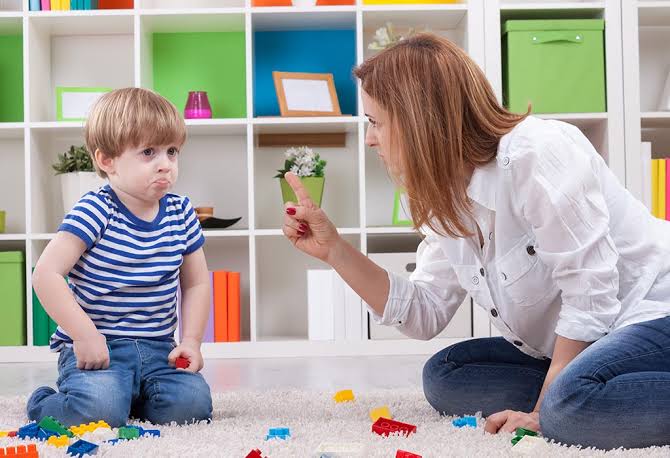What is Your Parenting Style and How will it affect your kids?
Find out Your Parenting Style Here
ALL TOPICS
- YouTube Parental Control
-
- How to see your YouTube history?
- What is Metaverse? Parent Guide
- Put parental controls on YouTube
- Delete TikTok Account without Phone Number
- Ways to block YouTube channels
- Ways to Get Somone's IP Address and Hide IP Address
- A complete guide on YouTube parental control
- What is Fanfiction? Parents Guide
- Kids safe YouTube alternative
- Top 5 TikTok Alternatives
- Methods to restrict YouTube adult content
- Social Media App Parental Controls
- Parental Control Tips
Jan 10, 2025 Filed to: Parent's Guide Proven solutions
The responsibility of bringing up another individual is undoubtedly a great challenge for every living being out there. It becomes even more challenging when you know that the way you treat your kids today contributes a lot in defining their personality later on.
Yes, you have read it right. A child's sensitive brain is programmed to observe, learn, and adapt. Therefore, different parenting styles influence a child differently.

What do you mean by the term parenting style?
You might wonder what I mean by "parenting style"? Honestly, this term was first introduced in the 1960s by Diane Baumrind, who used it for categorizing different strategic approaches that most parents use to raise their children. However, many parents are still not very aware of it. This is crazy, but the modern era of digitization has somehow created this awareness.
People are now relatively more aware of the four types of parenting styles that exist typically and are thus wise enough to adopt one sensibly.
Your frowned face is indicating that you are still not familiar with either of these types. There is no need to take it to heart; I am here to explain all that you may need to know to be a better parent to your piece of heart. So, without wasting any millisecond of your precious time, I must introduce you to the four distinct parenting styles followed by most parents today.
Four types of parenting styles
Researchers have broadly classified parenting styles into four distinct types depending upon several identifiable characteristics they have. Throwing light on all four of them will surely help you decide which one suits the best in your case.
It will further help you identify the parenting style that you have currently adopted to raise your offspring.
1. Authoritarian Parenting
Have you ever tried to impose specific rules or decisions on your child without considering his opinion or choice? If yes, then this is precisely what this parenting style is all about.

In other words, authoritarian parents focus more on disciplining the child by following what they think is best for them.
They craft rules, set limits, have expectations, and have defined adequate and inadequate standards of their own without paying attention to their child's needs, thoughts, feelings, wishes, choices, opinions, or wants.
For them, children who tend to get out of the bubble that they had sensibly created are rebellions and thus must be punished right away.
Here the focus is on punishing the child for his mistake rather than giving him the time to realize it independently.
Another noteworthy trait of this parenting style is that it merely encourages the idea of explaining anything to the child for a better understanding. The main idea behind it is to treat your child like a slave who is bound to obey your commands no matter what.
Children of authoritarian parents often find it challenging to make decisions. In fact, they are great liars who are experts at finding ways to escape punishments and critical situations where they are answerable for their conduct.
Their low self-esteem also contributes to giving others a chance to make fun of them. As a result, they grow up as quiet, introverted, and inexpressive beings who are always afraid to take risks.
Apart from that, these children exhibit poor social skills, and the frustration and aggression in them often attract them to make choices that may have a negative impact on their and their family's esteem and dignity.
To be more precise, such children exhibit an innocent outlook but are always searching for an opportunity to take revenge on their parents.
2. Authoritative Parenting
Authoritative parenting nurtures a child's individuality. It is centered around the belief that every individual is different from one another and thus gives value to the child's ease, opinion, and choice.

Like authoritarian parenting, the parents define rules and boundaries independently, but the child is not forced to obey them.
The focus here is to build a healthy relationship with the child, where he is warned about the consequences of disobeying the rules or going beyond the boundaries. Still, he is not punished if he fails to meet the expectations.
Authoritative parents are also quite encouraging. They often greet their kids with rewards and never miss out on a chance to praise them. As a result, trust and affection develop between the parents and the child, and it continues to get stronger with time.
Children of authoritative parents are good at making decisions on their own. They are better able to evaluate the consequence of stepping out of their comfort zone and are thus wise enough to act independently in every walk of life.
They are often the happiest, confident, mild-mannered, polite, and self-aware individuals you will ever meet. Their honesty compliments their wisdom, while their exemplary social skills, leadership abilities, and expressive nature is a clear reflection of the attractive personality that they possess.
3. Permissive Parenting
Permissive parents are more appropriately referred to as friends who set rules but are not concerned about their enforcement. These parents believe that their children will learn on their own and experience and realize good or bad. Therefore, they merely discuss consequences and often let them do what they are comfortable with.

Their lenient attitude never allows them to punish their child. They stay polite even when they are required to act strictly. They never restrict their child from anything that can harm their future, health, or existence. Even if they try to be strict and disciplined, they trust their child's promise of not repeating his mistakes.
The best part regarding this parenting style is that it encourages a child to share his thoughts, opinions, problems, likes, and dislikes without fear or hesitation. However, parents only interfere if they think that the issue demands their experience and wisdom on an urgent basis.
Children of permissive parents never adopt a serious or focused attitude towards anything in life. They are usually the least motivated individuals that you will ever meet and merely believe in setting goals or targets that they need to achieve in life. Consequently, they often suffer academic hindrances and have low self-esteem. They are even more likely to face health issues, including obesity and dental health problems.
Uninvolved Parenting
This parenting style is rarely observed among devoted parents. It believes in letting the child grow on his own without any interference or guidance of any sort.

Parents adopting this type of parenting style have no interest in what their child is doing or where he is. They are not even interested in listening to their child's problems, likes, dislikes, concerns, or fears.
Parents who adopt this type of parenting approach are either mentally or physically challenged or are slightly over-burdened by other worries and responsibilities that they merely have the energy and time to invest in their most significant asset of life.
Children of uninvolved parents are always the loneliest being on earth. They have extreme self-esteem issues and are more likely to stay sad most of the time.
Self-pity is an integral part of their personality, and never performs well in schools. Their behavioral issues and moody nature often contributes to making them a rejected member of society.
By now, you might have identified the name of your parenting style. However, irrespective of the approach you follow, there are specific challenges faced by every other parent today. Are you even well-equipped or well aware of facing them like a brave warrior? Well, let's find out.
Prominent parenting challenges of today
The word internet itself is enough to hurt your wounds. But another more appropriate term that is undoubtedly the root cause of every other challenge is "Digital Addiction."
Your neighbors have often heard you screaming your head off but do they even know about your child's love for his tablet or cell phone, destroying his abilities to study, interact, and grow as an individual.
I truly understand your pain; hence, I have come with a solution to this issue. Cheer up and build your trust in the FamiSafe parental control application that will be your Jenny for life.
How FamiSafe brings your child out of his Digital Addiction?
The answer is pretty simple. Download this app, register yourself, and subscribe to the plan that best suits you. Once you are done with that, you may easily use this app to block or blacklist the apps that your child loves.
You are even provided with a feature to limit your child's screen time for a specific time window, and you can also monitor the amount of time your child spends on a particular app or game daily.
Apart from that, parental alerts are also provided when your child navigates to any inappropriate site or sends or receives any inappropriate text that is not right for the people of his age.
FamiSafe can also help you stay aware of what your child does on his social media account and thus ensures never gives your child a chance to dodge you.
Isn't it a fantastic app? Stop praising it in your heart and hit the download button now; I am sure you are eagerly waiting for your child to pay attention to things other than his mobile phone or tablet.
- Location Tracking & Geo-fencing
- App Blocker
- Web Filtering
- Screen Time Control
- Smart Parental Control Setting
Parenting is never about following a single one out of the four types of parenting styles that exist. It is rather about wisely shifting from one style to another as per the need of the hour or the situation's nature. This magical balance is precisely what almost all parents need to raise their children in the best possible manner.
Therefore, the right approach, in my opinion, is to define rules and set limits but always be there to answer the questions, issues, or problems that your child has. Strictly enforce rules only when there is no other way out, and never forget to reward or praise your child even for the little good he does. In simple words, be your child's best friend but use your right to act as a parent if and when needed.


Moly Swift
staff Editor